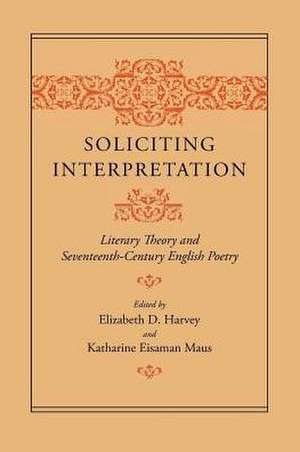Soliciting Interpretation: Literary Theory and Seventeenth-Century English Poetry
Editat de Professor Elizabeth D. Harvey, Katharine Eisaman Mausen Limba Engleză Paperback – 8 aug 1990
This collection gathers new essays by critics and scholars who are currently reshaping our sense of the function and nature of seventeenth-century poetry. Contributors return to the New Critical canon of Renaissance poetry with fresh perspectives that emphasize considerations of gender, ideology, power, and language.
In the first group of essays, David Norbrook, Annabel Patterson, John Guillory, Rosemary Kegl, and Stephen Orgel explore the various ways in which a text can be "political." Next, Arthur Marotti, Jane Tylus, and Jonathan Goldberg consider the circumstances of textual production and reception in the seventeenth century. Finally, Stanley Fish, Gordon Braden, Michael C. Schoenfeldt, and Maureen Quilligan discuss the particular forms of anxiety that result when seventeenth-century poets modify the traditional rhetoric of sexual desire to serve what seem to be erotic or religious purposes.
These essays, accompanied by an extensive editors' introduction, intersect less in their shared enthusiasm for particular authors or interpretative methods than in a common interest in particular critical issues. They present the most exciting work by critics redefining Renaissance studies.
In the first group of essays, David Norbrook, Annabel Patterson, John Guillory, Rosemary Kegl, and Stephen Orgel explore the various ways in which a text can be "political." Next, Arthur Marotti, Jane Tylus, and Jonathan Goldberg consider the circumstances of textual production and reception in the seventeenth century. Finally, Stanley Fish, Gordon Braden, Michael C. Schoenfeldt, and Maureen Quilligan discuss the particular forms of anxiety that result when seventeenth-century poets modify the traditional rhetoric of sexual desire to serve what seem to be erotic or religious purposes.
These essays, accompanied by an extensive editors' introduction, intersect less in their shared enthusiasm for particular authors or interpretative methods than in a common interest in particular critical issues. They present the most exciting work by critics redefining Renaissance studies.
Preț: 322.17 lei
Nou
Puncte Express: 483
Preț estimativ în valută:
61.66€ • 64.13$ • 51.67£
61.66€ • 64.13$ • 51.67£
Carte tipărită la comandă
Livrare economică 14-28 martie
Preluare comenzi: 021 569.72.76
Specificații
ISBN-13: 9780226318769
ISBN-10: 0226318761
Pagini: 376
Ilustrații: 6 halftones
Dimensiuni: 152 x 229 x 20 mm
Greutate: 0.51 kg
Ediția:1
Editura: University of Chicago Press
Colecția University of Chicago Press
ISBN-10: 0226318761
Pagini: 376
Ilustrații: 6 halftones
Dimensiuni: 152 x 229 x 20 mm
Greutate: 0.51 kg
Ediția:1
Editura: University of Chicago Press
Colecția University of Chicago Press
Notă biografică
Elizabeth D. Harvey is assistant professor of English at the University of Western Ontario. Katharine Eisaman Maus, associate professor of English at the University of Virginia, is the author of Ben Jonson and the Roman Frame of Mind.
Cuprins
Acknowledgments
Introduction
Katharine Eisaman Maus and Elizabeth D. Harvey
I. The Politics of Poetic Representation
1. The Monarchy of Wit and the Republic of Letters: Donne's Politics
David Norbrook
2. All Donne
Annabel Patterson
3. From the Superfluous to the Supernumerary: Reading Gender into Paradise Lost
John Guillory
4. "Joyning my Labour to my Pain": The Politics of Labor in Marvell's Mower Poems
Rosemary Kegl
5. Jonson and the Amazons
Stephen Orgel
II. Literary Thought and the Transmission of the Text
6. Shakespeare's Sonnets as Literary Property
Arthur F. Marotti
7. Jacobean Poetry and Lyric Disappointment
Jane Tylus
8. Dating Milton
Jonathan Goldberg
III. Poetic Subjectivity and the Language of Desire
9. Masculine Persuasive Force: Donne and Verbal Power
Stanley Fish
10. Unspeakable Love: Petrarch to Herbert
Gordon Braden
11. "That Ancient Heat": Sexuality and Spirituality in The Temple
Michael C. Schoenfeldt
12. The Constant Subject: Instability and Authority in Wroth's Urania Poems
Maureen Quilligan
List of Contributors
Index of Names
Introduction
Katharine Eisaman Maus and Elizabeth D. Harvey
I. The Politics of Poetic Representation
1. The Monarchy of Wit and the Republic of Letters: Donne's Politics
David Norbrook
2. All Donne
Annabel Patterson
3. From the Superfluous to the Supernumerary: Reading Gender into Paradise Lost
John Guillory
4. "Joyning my Labour to my Pain": The Politics of Labor in Marvell's Mower Poems
Rosemary Kegl
5. Jonson and the Amazons
Stephen Orgel
II. Literary Thought and the Transmission of the Text
6. Shakespeare's Sonnets as Literary Property
Arthur F. Marotti
7. Jacobean Poetry and Lyric Disappointment
Jane Tylus
8. Dating Milton
Jonathan Goldberg
III. Poetic Subjectivity and the Language of Desire
9. Masculine Persuasive Force: Donne and Verbal Power
Stanley Fish
10. Unspeakable Love: Petrarch to Herbert
Gordon Braden
11. "That Ancient Heat": Sexuality and Spirituality in The Temple
Michael C. Schoenfeldt
12. The Constant Subject: Instability and Authority in Wroth's Urania Poems
Maureen Quilligan
List of Contributors
Index of Names
